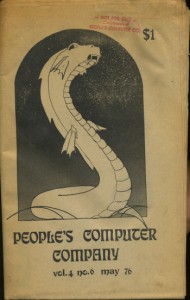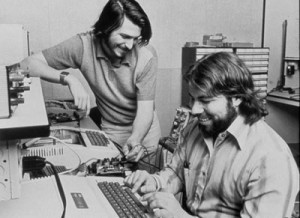Time magazine heralded the advent of the Digital Age in its March 1, 1995 issue, which included an essay by Stewart Brand called “We Owe It All to the Hippies.” The piece argued, quite rightly, that the impetus for our booming tech sector came from the counterculture, courtesy of dropouts, phreaks, and hackers. An excerpt:
“In the 1960s and early ’70s, the first generation of hackers emerged in university computer-science departments. They transformed mainframes into virtual personal computers, using a technique called time sharing that provided widespread access to computers. Then in the late ’70s, the second generation invented and manufactured the personal computer. These nonacademic hackers were hard-core counterculture types — like Steve Jobs, a Beatle- haired hippie who had dropped out of Reed College, and Steve Wozniak, a Hewlett-Packard engineer. Before their success with Apple, both Steves developed and sold ‘blue boxes,’ outlaw devices for making free telephone calls. Their contemporary and early collaborator, Lee Felsenstein, who designed the first portable computer, known as the Osborne 1, was a New Left radical who wrote for the renowned underground paper the Berkeley Barb.
As they followed the mantra ‘Turn on, tune in and drop out,’ college students of the ’60s also dropped academia’s traditional disdain for business. ‘Do your own thing’ easily translated into ‘Start your own business.’ Reviled by the broader social establishment, hippies found ready acceptance in the world of small business. They brought an honesty and a dedication to service that was attractive to vendors and customers alike. Success in business made them disinclined to ‘grow out of’ their countercultural values, and it made a number of them wealthy and powerful at a young age.
 The third generation of revolutionaries, the software hackers of the early ’80s, created the application, education and entertainment programs for personal computers. Typical was Mitch Kapor, a former transcendental-meditation teacher, who gave us the spreadsheet program Lotus 1-2-3, which ensured the success of IBM’s Apple-imitating PC. Like most computer pioneers, Kapor is still active. His Electronic Frontier Foundation, which he co- founded with a lyricist for the Grateful Dead, lobbies successfully in Washington for civil rights in cyberspace. In the years since Levy’s book, a fourth generation of revolutionaries has come to power. Still abiding by the Hacker Ethic, these tens of thousands of netheads have created myriad computer bulletin boards and a nonhierarchical linking system called Usenet. At the same time, they have transformed the Defense Department-sponsored ARPAnet into what has become the global digital epidemic known as the Internet. The average age of today’s Internet users, who number in the tens of millions, is about 30 years. Just as personal computers transformed the ’80s, this latest generation knows that the Net is going to transform the ’90s. With the same ethic that has guided previous generations, today’s users are leading the way with tools created initially as ‘freeware’ or ‘shareware,’ available to anyone who wants them. Of course, not everyone on the electronic frontier identifies with the countercultural roots of the ’60s. One would hardly call Nicholas Negroponte, the patrician head of M.I.T.’s Media Lab, or Microsoft magnate Bill Gates ‘hippies.’ Yet creative forces continue to emanate from that period. Virtual reality — computerized sensory immersion — was named, largely inspired and partly equipped by Jaron Lanier, who grew up under a geodesic dome in New Mexico, once played clarinet in the New York City subway and still sports dreadlocks halfway down his back. The latest generation of supercomputers, utilizing massive parallel processing, was invented, developed and manufactured by Danny Hillis, a genial longhair who set out to build ‘a machine that could be proud of us.’ Public-key encryption, which can ensure unbreakable privacy for anyone, is the brainchild of Whitfield Diffie, a lifelong peacenik and privacy advocate who declared in a recent interview, ‘I have always believed the thesis that one’s politics and the character of one’s intellectual work are inseparable.’ Our generation proved in cyberspace that where self-reliance leads, resilience follows, and where generosity leads, prosperity follows. If that dynamic continues, and everything so far suggests that it will, then the information age will bear the distinctive mark of the countercultural ’60s well into the new millennium.”
The third generation of revolutionaries, the software hackers of the early ’80s, created the application, education and entertainment programs for personal computers. Typical was Mitch Kapor, a former transcendental-meditation teacher, who gave us the spreadsheet program Lotus 1-2-3, which ensured the success of IBM’s Apple-imitating PC. Like most computer pioneers, Kapor is still active. His Electronic Frontier Foundation, which he co- founded with a lyricist for the Grateful Dead, lobbies successfully in Washington for civil rights in cyberspace. In the years since Levy’s book, a fourth generation of revolutionaries has come to power. Still abiding by the Hacker Ethic, these tens of thousands of netheads have created myriad computer bulletin boards and a nonhierarchical linking system called Usenet. At the same time, they have transformed the Defense Department-sponsored ARPAnet into what has become the global digital epidemic known as the Internet. The average age of today’s Internet users, who number in the tens of millions, is about 30 years. Just as personal computers transformed the ’80s, this latest generation knows that the Net is going to transform the ’90s. With the same ethic that has guided previous generations, today’s users are leading the way with tools created initially as ‘freeware’ or ‘shareware,’ available to anyone who wants them. Of course, not everyone on the electronic frontier identifies with the countercultural roots of the ’60s. One would hardly call Nicholas Negroponte, the patrician head of M.I.T.’s Media Lab, or Microsoft magnate Bill Gates ‘hippies.’ Yet creative forces continue to emanate from that period. Virtual reality — computerized sensory immersion — was named, largely inspired and partly equipped by Jaron Lanier, who grew up under a geodesic dome in New Mexico, once played clarinet in the New York City subway and still sports dreadlocks halfway down his back. The latest generation of supercomputers, utilizing massive parallel processing, was invented, developed and manufactured by Danny Hillis, a genial longhair who set out to build ‘a machine that could be proud of us.’ Public-key encryption, which can ensure unbreakable privacy for anyone, is the brainchild of Whitfield Diffie, a lifelong peacenik and privacy advocate who declared in a recent interview, ‘I have always believed the thesis that one’s politics and the character of one’s intellectual work are inseparable.’ Our generation proved in cyberspace that where self-reliance leads, resilience follows, and where generosity leads, prosperity follows. If that dynamic continues, and everything so far suggests that it will, then the information age will bear the distinctive mark of the countercultural ’60s well into the new millennium.”
••••••••••
As mentioned in the article, the Osborne I, the first portable computer:
More Stewart Brand Posts:
Tags: Stewart Brand

